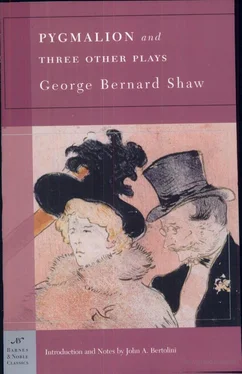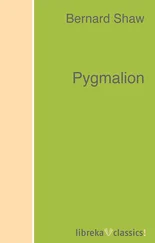The English have no respect for their language, and will not teach their children to speak it. They spell it so abominably that no man can teach himself what it sounds like. It is impossible for an Englishman to open his mouth without making some other Englishman hate or despise him. German and Spanish are accessible to foreigners: English is not accessible even to Englishmen. The reformer England needs today is an energetic phonetic enthusiast: that is why I have made such a one the hero of a popular play. There have been heroes of that kind crying in the wilderness for many years past. When I became interested in the subject towards the end of the eighteen-seventies, Melville Bell {45} 45 1 (p. 361) Melville Bell: The reference is to American teacher of elocution Alexander Melville Bell (1819-1905); inspired by his wife’s deafness, he invented “visible speech,” a system of written sounds, to help deaf-mutes communicate.
was dead; but Alexander J. Ellis [172] English philologist and mathematician (1814-1890); an advocate of spelling reform.
was still a living patriarch, with an impressive head always covered by a velvet skull cap, for which he would apologize to public meetings in a very courtly manner. He and Tito Pagliardini, [173] Italian singer (1817 — 1895) who taught French in England and advocated a phonetic alphabet.
another phonetic veteran, were men whom it was impossible to dislike. Henry Sweet, then a young man, lacked their sweetness of character: he was about as conciliatory to conventional mortals as Ibsen or Samuel Butler. His great ability as a phonetician (he was, I think, the best of them all at his job) would have entitled him to high official recognition, and perhaps enabled him to popularize his subject, but for his Satanic contempt for all academic dignitaries and persons in general who thought more of Greek than of phonetics. Once, in the days when the Imperial Institute [174] Institute founded in 1887 to conduct research into resources and raw materials of the British Empire, and to make the growing Empire understandable to the British people.
rose in South Kensington, and Joseph Chamberlain was booming the Empire, I induced the editor of a leading monthly review to commission an article from Sweet on the imperial importance of his subject. When it arrived, it contained nothing but a savagely derisive attack on a professor of language and literature whose chair Sweet regarded as proper to a phonetic expert only. The article, being libelous, had to be returned as impossible; and I had to renounce my dream of dragging its author into the limelight. When I met him afterwards, for the first time for many years, I found to my astonishment that he, who had been a quite tolerably presentable young man, had actually managed by sheer scorn to alter his personal appearance until he had become a sort of walking repudiation of Oxford and all its traditions. It must have been largely in his own despite that he was squeezed into something called a Readership of phonetics there. The future of phonetics rests probably with his pupils, who all swore by him; but nothing could bring the man himself into any sort of compliance with the university, to which he nevertheless clung by divine right in an intensely Oxonian way. I daresay his papers, if he has left any, include some satires that may be published without too destructive results fifty years hence. He was, I believe, not in the least an illnatured man: very much the opposite, I should say; but he would not suffer fools gladly.
Those who knew him will recognize in my third act the allusion to the patent shorthand in which he used to write postcards, and which may be acquired from a four and six-penny manual [175] Reference to A Manual of Current Shorthand (1892).
published by the Clarendon Press. The postcards which Mrs. Higgins describes are such as I have received from Sweet. I would decipher a sound which a cockney would represent by zerr, and a Frenchman by seu, and then write demanding with some heat what on earth it meant. Sweet, with boundless contempt for my stupidity, would reply that it not only meant but obviously was the word Result, as no other word containing that sound, and capable of making sense with the context, existed in any language spoken on earth. That less expert mortals should require fuller indications was beyond Sweet’s patience. Therefore, though the whole point of his “Current Shorthand” is that it can express every sound in the language perfectly, vowels as well as consonants, and that your hand has to make no stroke except the easy and current ones with which you write m, n, and u, l, p, and q, scribbling them at whatever angle comes easiest to you, his unfortunate determination to make this remarkable and quite legible script serve also as a shorthand reduced it in his own practice to the most inscrutable of cryptograms. His true objective was the provision of a full, accurate, legible script for our noble but ill-dressed language; but he was led past that by his contempt for the popular Pitman system of shorthand, [176] Named after its inventor, Sir Isaac Pitman (1813-1897).
which he called the Pitfall system. The triumph of Pitman was a triumph of business organization: there was a weekly paper to persuade you to learn Pitman: there were cheap textbooks and exercise books and transcripts of speeches for you to copy, and schools where experienced teachers coached you up to the necessary proficiency. Sweet could not organize his market in that fashion. He might as well have been the Sybil who tore up the leaves of prophecy that nobody would attend to. [177] Amalthaea, the Sibyl of Cumae, was a legendary prophetess of ancient Rome who destroyed six of nine prophetic books when the Roman king refused to pay for them.
The four and six-penny manual, mostly in his lithographed handwriting, that was never vulgarly advertized, may perhaps some day be taken up by a syndicate and pushed upon the public as The Times pushed the Encyclopaedia Britannica; but until then it will certainly not prevail against Pitman. I have bought three copies of it during my lifetime; and I am informed by the publishers that its cloistered existence is still a steady and healthy one. I actually learned the system two several times; and yet the shorthand in which I am writing these lines is Pitman’s. And the reason is, that my secretary cannot transcribe Sweet, having been perforce taught in the schools of Pitman. Therefore, Sweet railed at Pitman as vainly as Thersites railed at Ajax: his raillery, however it may have eased his soul, gave no popular vogue to Current Shorthand.
Pygmalion Higgins is not a portrait of Sweet, to whom the adventure of Eliza Doolittle would have been impossible; still, as will be seen, there are touches of Sweet in the play. With Higgins’s physique and temperament Sweet might have set the Thames on fire. As it was, he impressed himself professionally on Europe to an extent that made his comparative personal obscurity, and the failure of Oxford to do justice to his eminence, a puzzle to foreign specialists in his subject. I do not blame Oxford, because I think Oxford is quite right in demanding a certain social amenity from its nurslings (heaven knows it is not exorbitant in its requirements!); for although I well know how hard it is for a man of genius with a seriously underrated subject to maintain serene and kindly relations with the men who underrate it, and who keep all the best places for less important subjects which they profess without originality and sometimes without much capacity for them, still, if he overwhelms them with wrath and disdain, he cannot expect them to heap honors on him.
Of the later generations of phoneticians I know little. Among them towers the Poet Laureate, [178] Robert Bridges, poet laureate of England (1913-1930) and author of Milton’s Prosody (1893), practiced spelling reform.
to whom perhaps Higgins may owe his Miltonic sympathies, though here again I must disclaim all portraiture. But if the play makes the public aware that there are such people as phoneticians, and that they are among the most important people in England at present, it will serve its turn.
Читать дальше












